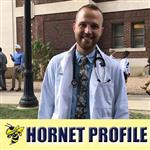2011 Nelson, Jacob
JACOB NELSON CLASS OF 2011
 When did you graduate from HHS and where did you go from here?
When did you graduate from HHS and where did you go from here?
I graduated HHS in 2011, and afterward I attended Western Michigan University for my undergraduate degree. My initial interests were in global economics, but after interning for the State Representative of Genesee County I decided to pursue medicine. Following that career change, I started teaching an organic chemistry lab and worked in an ER as a scribe. In 2016 I graduated college double majoring in Biomedical Sciences and Political Science with minors in Chemistry and Economics. Following my graduation, I did climate change/atmospheric chemistry research in Northern Michigan for a summer, after which I returned to scribing in the ER. Currently, I am entering my first year as a student at The University of Michigan Medical School, with plans to specialize in Cardiology or Ophthalmology.
Can you tell us a little bit about the company you work for?
The University of Michigan Medical School is one of the top Medical Schools in the country. Graduates have include Nobel Prize winners and a former Army Surgeon General. Above all else, the Michigan Medical School is dedicated to changing medicine through interdisciplinary team-work and innovation. We have what we call "Paths of Excellence", which are 8 different career tracks that aspiring Physicians can pursue and be leaders in. These paths include "Global Health and Disparities", "Health Policy", "Innovation & Entrepreneurship", and my planned path; "Scientific Discovery".
What does your workday look like?
We haven't officially started classes yet, but I know there is a lot of variation in my day depending on the week and course. I do not have to attend lecture, those are posted online and we can stream them from home, but there are other courses that we need to be on campus for. A few good examples are our anatomical dissections and our "Doctoring" course, which is where we learn how to interact with patients as well as skills such as drawing blood. I do plan to do stem-cell research, so my mornings will most likely involve being in the lab (We are attempting to regrow retina tissue!).
Can you tell us what your time at HHS was like?
My time at HHS was great, I played a few different sports including basketball, football, and soccer. I was definitely a nerd back then and found almost all my classes interesting, but I wasn't really motivated and shirked homework until the last minute. I think what I most remember are my friends and the times we had together. I actually still talk to my best friend from high school regularly, and even though we went different ways and are quite different people now there is a comradery there that we will always have.
How did your time at HHS help you now?
My time at HHS really provided a solid foundation. Like I said, I wasn't the most motivated high school student, but a lot of teachers were able to make learning fun and interesting so when I found that motivation later I already had the love for the topics.
Is there a teacher who had a significant impact on your life?
There were three teachers that really impacted me. The first would be Mr. Potter, who's AP American History course I took my Junior year. I actually got a C in that class, but that course is what got me interested in Political Science and led to me pursuing my internship. The second is Ms. Gramling. She taught my physics course and that was really where I became interested in the big questions of life. Had I not gone into medicine I am pretty confident I would have tried theoretical physics. Finally, Mr. Patterson. I took "Chip's" AP Environmental Course, where I competed in the Envirothon. That course sparked what would be a continued passion in Environmental Science, and I still do work in the that field despite it not being my main career.
Anything else?
I have two pieces of advice for students. The first is to trust your instincts; if you're planning big things, a lot of people are going to question your professional and personal decisions. Stick to what you believe in. The second is to expose yourself to diversity. Being able to look at situations from someone else's point of view is a valuable tool in the work place, and one that allows you to solve problems better and faster than you could on your own.

